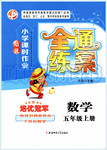题目内容
The clerk’s best-known work that is all praises can be seen in the public library.
A. beyond B. within C. with D. without
A

 小学课时作业全通练案系列答案
小学课时作业全通练案系列答案 金版课堂课时训练系列答案
金版课堂课时训练系列答案 单元全能练考卷系列答案
单元全能练考卷系列答案 新黄冈兵法密卷系列答案
新黄冈兵法密卷系列答案One day while shopping in a small town in southern California,it was my misfortune to be approached by a clerk whose personality conflicted with mine. He seemed most unfriendly and not at all concerned about my intended purchase. I bought nothing,and marched angrily out of the store. My hostility(敌意) toward that clerk increased with each step.
On the outside,standing by the road,was a darkskinned young man in his early twenties. His expressive brown eyes met and held mine,and in the next instant a beautiful, dazzling smile covered his face. I gave way immediately. The magnetic(磁力的) power of that smile dissolved all bitterness within me,and I found the muscles in my own face happily responding(回应).
“Beautiful day,isn't it?”I remarked,in passing. Then,I turned back.“I really owe you a debt of gratitude,”I said softly.
His smile deepened, but he made no attempt to answer.A Mexican woman and two men were standing nearby.The woman stepped forward and volunteered, "Sir, but he doesn't speak English.Do you want me to tell him something?" In that moment I felt transformed(改变).The young man's smile had made a big person of me.My friendliness and good will toward all mankind stood ten feet tall.
"Thank you?" The woman seemed slightly puzzled.
I gave her arm a friendly pat as I turned to leave."Just tell him that," I insisted."He'll understand.I am sure !"
Oh, what a smile can do! Although I have never seen that young man again, I shall never forget the lesson he taught me that morning.From that day on, I became smile-conscious, and I practice the art anywhere and everywhere, with everybody.
【小题1】Why did the author leave the store angrily?
| A.The clerk treated him unkindly. | B.He couldn't buy what he wanted. |
| C.The clerk didn't speak English. | D.The store's goods were too dear. |
| A.he was still angry | B.he did not want to smile |
| C.he would thank the young man | D.he smiled back at the young man |
| A.had helped the author before | B.taught the author how to smile |
| C.was a kind employee of the store | D.taught the author a valuable lesson |
| A.be generous to strangers | B.practice smiling every day |
| C.smile at other people | D.help people in trouble |
One day while shopping in a small town in southern California, it was my misfortune to be approached by a clerk.He seemed most unfriendly and not at all concerned about my intended purchase.I bought nothing, and marched angrily out of the store.
On the outside was a dark-skinned young man in his early twenties.His expressive brown eyes met and held mine, and in the next instant a beautiful, bright smile covered his face.I gave in immediately.The power of that broad smile dissolved all bitterness within me, and I felt the muscles in my own face happily responding.
"Beautiful day, isn't it?" I remarked, passing.Then I turned back."I really owe you a debt of thanks," I said softly.
His smile deepened, but he made no attempt to answer.A Mexican woman and two men were standing nearby.The woman stepped forward and volunteered, "Sir, but he doesn't speak English.Do you want me to tell him something?" In that moment I felt transformed.The young man's smile had made a big person of me.My friendliness and good will toward all mankind stand ten feet tall.
“Yes,” my reply was enthusiastic and sincere, “tell him I said, ‘Thank you!’”
“Thank you?” The woman seemed slightly puzzled.
I gave her arm a friendly pat as I turned to leave."Just tell him that," I insisted."He'll understand.I am sure!"
Oh, what a smile can do! Although I have never seen that young man again, I shall never forget the lesson he taught me that morning.From that day on, I became smile-conscious, and I practice the art diligently anywhere and everywhere, with everybody.
【小题1】 Why did the author leave the store angrily?
| A.He couldn't buy what he wanted. |
| B.The clerk treated him unkindly. |
| C.The clerk didn't speak English. |
| D.The store's goods were too dear. |
| A.he smiled back at the young man |
| B.he did not want to smile |
| C.he would thank the young man |
| D.he was still in a bad mood |
| A.had helped the author before |
| B.taught the author how to smile |
| C.taught the author a valuable lesson |
| D.was a kind employee of the store |
| A.be generous to strangers |
| B.practice smiling every day |
| C.help people in trouble |
| D.smile at other people |
Would you like to be a king or queen? To have people waiting on you hand and foot? Many Americans experience this royal treatment every day. How? By being customers. The American idea of customer service is to make each customer the center of attention. Need proof? Just listen to the commercials. Most of them sound like the McDonald’s ad: “We do it all for you.” Actually, not all stores in America roll out the red carpet for their customers. But wherever you go, good customer service means making customers feel special.
People going shopping in America can expect to be treated with respect from the very beginning. Most places don’t have a “furniture street” or a “computer road” which allow you to compare prices easily. Instead, people often “let their fingers do the walking” through the store hot lines. From the first “hello”, customers receive a satisfying response to their questions. This initial contact can help them decide where to shop.
When customers get to the store, they are treated as honored guests. Customers don’t usually find store clerks sitting around watching TV or playing cards. Instead, the clerks greet them warmly and offer to help them find what they want. In most stores, the clear signs that label each department make shopping a breeze. Customers usually don’t have to ask how much items cost, since prices are clearly marked. And unless they’re at a flea market or a yard sale, they don’t bother trying to bargain.
When customers are ready to check out, they find the nearest and shortest checkout lane. But as Murphy’s Law would have it, whichever lane they get in, all the other lanes will move faster. Good stores open new checkout lanes when the lanes get too long. Some even offer express lanes for customers with 10 items or less. After they pay for their purchases, customers receive a smile and a warm “thank you” from the clerk. Many stores even allow customers to take their shopping carts out to the parking lot. That way, they don’t have to carry heavy bags out to the car.
【小题1】 By quoting (引用) the McDonald’s ad: “We do it all for you”, the author intends to_______.
| A.suggest that customers believe what commercials say deeply |
| B.show readers the American idea on good customer service |
| C.express all the stores pay much attention to the customers |
| D.persuade readers to choose the stores with ads correctly |
| A.To visit a professional street with lots of similar stores. |
| B.To compare prices in many shops in the same street. |
| C.To make phone calls and get better shopping choices. |
| D.To receive other customers’ answers to the questions. |
| A.an easy job | B.a trouble | C.a funny thing | D.a boring task |
| A.The store clerks don’t usually sit around watching TV or playing cards. |
| B.Some stores offer price bargain to the customers like a yard sale. |
| C.The clerks give customers a smile and a warm “thank you” after paying. |
| D.Some stores open new checkout lanes when the lanes are crowded. |
| A.Customer Service in America | B.Excellent Stores in America |
| C.Shopping Rules in America | D.Being King or Queen in America |